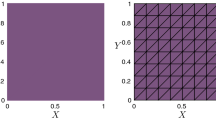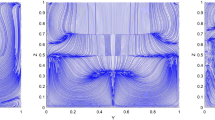Abstract
This paper focuses on new error analysis of a class of mixed FEMs for stationary incompressible magnetohydrodynamics with the standard inf-sup stable velocity-pressure space in cooperation with Navier-Stokes equations and the Nédélec’s edge element for the magnetic field. The methods have been widely used in various numerical simulations in the last several decades, while the existing analysis is not optimal due to the strong coupling of system and the pollution of the lower-order Nédélec’s edge approximation in analysis. In terms of a newly modified Maxwell projection we establish new and optimal error estimates. In particular, we prove that the method based on the commonly-used Taylor-Hood/lowest-order Nédélec’s edge element is efficient and the method provides the second-order accuracy for numerical velocity. Two numerical examples for the problem in both convex and nonconvex polygonal domains are presented, which confirm our theoretical analysis.


Similar content being viewed by others
References
Amrouche, C., Bernardi, C., Dauge, M., Girault, V.: Vector potentials in three-dimensional nonsmooth domains. Math. Meth. Appl. Sci. 21, 823–864 (1998)
Armero, F., Simo, J.C.: Long-term dissipativity of time-stepping algorithms for an abstract evolution equation with applications to the incompressible MHD and Navier-Stokes equations. Comput. Methods Appl. Mech. Eng. 131, 41–90 (1996)
Badia, S., Codina, R., Planas, R.: On an unconditionally convergent stabilized finite element approximation of resistive magnetohydrodynamics. J. Comput. Phys. 234, 399–416 (2013)
Christiansen, S.H., Munthe-Kaas, H.Z., Owren, B.: Topics in structure-preserving discretization. Acta Numer. 20, 1–119 (2011)
Costabel, M., Dauge, M.: Singularities of electromagnetic fields in polyhedral domains. Arch. Ration. Mech. Anal. 151, 221–276 (2000)
Dauge, M.: Neumann and mixed problems on curvilinear polyhedra. Integral Equ. Oper. Theory 15, 227–261 (1992)
Davidson, P.A.: An Introduction to Magnetohydrodynamics. Cambridge University Press, Cambridge (2001)
Ding, Q., Long, X., Mao, S.: Convergence analysis of Crank-Nicolson extrapolated fully discrete scheme for thermally coupled incompressible magnetohydrodynamic system. Appl. Numer. Math. 157, 522–543 (2020)
Ding, Q., Long, X., Mao, S.: Convergence analysis of a fully discrete finite element method for thermally coupled incompressible MHD problems with temperature-dependent coefficients. ESAIM: M2AN 56(3), 969–1005 (2022)
Dong, X., He, Y., Zhang, Y.: Convergence analysis of three finite element iterative methods for the 2D/3D stationary incompressible magnetohydrodynamics. Comput. Methods Appl. Mech. Eng. 276, 287–311 (2014)
Gao, H., Qiu, W.: A semi-implicit energy conserving finite element method for the dynamical incompressible magnetohydrodynamics equations. Comput. Methods Appl. Mech. Eng. 346, 982–1001 (2019)
Gao, H., Sun, W.: An efficient fully linearized semi-implicit Galerkin-mixed FEM for the dynamical Ginzburg-Landau equations of superconductivity. J. Comput. Phys. 294, 329–345 (2015)
Gao, H., Li, B., Sun, W.: Stability and error estimates of fully discrete Galerkin FEMs for nonlinear thermistor equations in non-convex polygons. Numer. Math. 136, 383–409 (2017)
Gerbeau, J.F.: A stabilized finite element method for the incompressible magnetohydrodynamic equations. Numer. Math. 87, 83–111 (2000)
Gerbeau, J.F., Le Bris, C., Leliévre, T.: Mathematical Methods for the Magnetohydrodynamics of Liquid Metals, Numerical Mathematics and Scientific Computation. Oxford University Press, New York (2006)
Greif, C., Li, D., Schötzau, D., Wei, X.: A mixed finite element method with exactly divergence-free velocities for incompressible magnetohydrodynamics. Comput. Methods Appl. Mech. Eng. 199, 2840–2855 (2010)
Gunzburger, M.D., Meir, A.J., Peterson, J.P.: On the existence, uniqueness, and finite element approximation of solutions of the equations of stationary, incompressible magnetohydrodynamics. Math. Comput. 56, 523–563 (1991)
Guzmán, J., Leykekhman, D., Rossmann, J., Schatz, A.H.: Hölder estimates for Green’s functions on convex polyhedral domains and their applications to finite element methods. Numer. Math. 112, 221–243 (2009)
He, Y., Zou, J.: A priori estimates and optimal finite element approximation of the MHD flow in smooth domains. ESAIM Math. Model. Numer. Anal. 52, 181–206 (2018)
He, Y.: Unconditional convergence of the Euler semi-implicit scheme for the three-dimensional incompressible MHD equations. IMA J. Numer. Anal. 35(2), 767–801 (2015)
Hiptmair, R., Li, M., Mao, S., Zheng, W.: A fully divergence-free finite element method for magnetohydrodynamic equations. Math. Models Methods Appl. Sci. 28, 659–695 (2018)
Hiptmair, R., Pagliantini, C.: Splitting-based structure preserving discretizations for magnetohydrodynamics. SMAI J. Comput. Math. 4, 225–257 (2018)
Hu, K., Ma, Y., Xu, J.: Stable finite element methods preserving \(\nabla \cdot {\textbf{B} }=0\) exactly for MHD models. Numer. Math. 135, 371–396 (2017)
Hu, K., Xu, J.: Structure-preserving finite element methods for stationary MHD models. Math. Comput. 88, 553–581 (2019)
Hughes, W.F., Young, F.J.: The Electromagnetics of Fluids. Wiley, New York (1966)
Jerison, D., Kenig, C.: The inhomogeneous Dirichlet problem in Lipschitz domains. J. Funct. Anal. 130, 161–219 (1995)
Jin, D., Ledger, P.D., Gil, A.J.: \(hp\)-finite element solution of coupled stationary magnetohydrodynamics problems including magnetostrictive effects. Comput. Struct. 164, 161–180 (2016)
Lee, J.J., Shannon, S.J., Bui-Thanh, T., Shadid, J.N.: Analysis of an HDG method for linearized incompressible resistive MHD equations. SIAM J. Numer. Anal. 57, 1697–1722 (2019)
Li, B., Wang, J., Xu, L.: A convergent linearized lagrange finite element method for the magneto-hydrodynamic equations in two-dimensional nonsmooth and nonconvex domains. SIAM J. Numer. Anal. 58, 430–459 (2020)
Li, L., Zheng, W.: A robust solver for the finite element approximation of stationary incompressible MHD equations in 3D. J. Comput. Phys. 351, 254–270 (2017)
Meir, A.J., Schmidt, P.G.: Analysis and numerical approximation of a stationary MHD flow problem with nonideal boundary. SIAM. J. Numer. Anal. 36, 1304–1332 (1999)
Moreau, R.: Magneto-Hydrodynamics. Kluwer Academic Publishers, New York (1990)
Müller, U., Büller, L.: Magnetofluiddynamics in Channels and Containers. Springer, Berlin (2001)
Monk, P.: Finite Element Methods for Maxwell’s Equations. Oxford University Press, NewYork (2003)
Pagliantini, C.: Computational Magnetohydrodynamics with Discrete Differential Forms, p. 4561. ETH Zürich, Zürich (2016)
Phillips, E.G., Elman, H.C.: A stochastic approach to uncertainty in the equations of MHD kinematics. J. Comput. Phys. 284, 334–350 (2015)
Phillips, E.G., Shadid, J.N., Cyr, E.C., Elman, H.C., Pawlowski, R.P.: Block preconditioners for stable mixed nodal and edge finite element representations of incompressible resistive MHD. SIAM J. Sci. Comput. 38(6), B1009–B1031 (2016)
Qiu, W., Shi, K.: A mixed DG method and an HDG method for incompressible magnetohydrodynamics. IMA J. Numer. Anal. 40(2), 1356–1389 (2020)
Schneebeli, A., Schötzau, D.: Mixed finite elements for incompressible magneto-hydrodynamics,. C. R. Acad. Sci. Paris Ser. I 337(1), 71–74 (2003)
Schötzau, D.: Mixed finite element methods for stationary incompressible magnetohydrodynamics. Numer. Math. 96, 315–341 (2004)
Wathen, M., Greif, Chen: A scalable approximate inverse block preconditioner for an incompressible magnetohydrodynamics model problem. SIAM J. Sci. Comput. 42(1), B57–B79 (2020)
Wathen, M., Greif, Chen, Schötzau, D.: Preconditioners for mixed finite element discretizations of incompressible MHD equations. SIAM J. Sci. Comput. 39(6), A2993–A3013 (2017)
Zhang, G., He, Y., Yang, D.: Analysis of coupling iterations based on the finite element method for stationary magnetohydrodynamics on a general domain. Comput. Math. Appl. 68(7), 770–788 (2014)
Funding
Weifeng Qiu is supported by a grant from the Research Grants Council of the Hong Kong Special Administrative Region, China (Project No. CityU 11302718). The work of Y. Huang and W. Sun was partially supported by National Natural Science Foundation of China (12231003 and 12071040), Guangdong Provincial Key Laboratory IRADS (2022B1212010006, UIC-R0400001-22) and Guangdong Higher Education Upgrading Plan (UIC-R0400024-21).
Author information
Authors and Affiliations
Contributions
YH, WQ and WS have participated sufficiently in the work to take public responsibility for the content, including participation in the concept, method, analysis and writing. All authors certify that this material or similar material has not been and will not be submitted to or published in any other publication.
Corresponding author
Ethics declarations
Conflict of interest
No conflict of interest exists.
Data Availability
Not applicable.
Code Availability
Not applicable.
Additional information
Publisher's Note
Springer Nature remains neutral with regard to jurisdictional claims in published maps and institutional affiliations.
Rights and permissions
Springer Nature or its licensor (e.g. a society or other partner) holds exclusive rights to this article under a publishing agreement with the author(s) or other rightsholder(s); author self-archiving of the accepted manuscript version of this article is solely governed by the terms of such publishing agreement and applicable law.
About this article
Cite this article
Huang, Y., Qiu, W. & Sun, W. New Analysis of Mixed Finite Element Methods for Incompressible Magnetohydrodynamics. J Sci Comput 95, 72 (2023). https://doi.org/10.1007/s10915-023-02189-3
Received:
Revised:
Accepted:
Published:
DOI: https://doi.org/10.1007/s10915-023-02189-3




